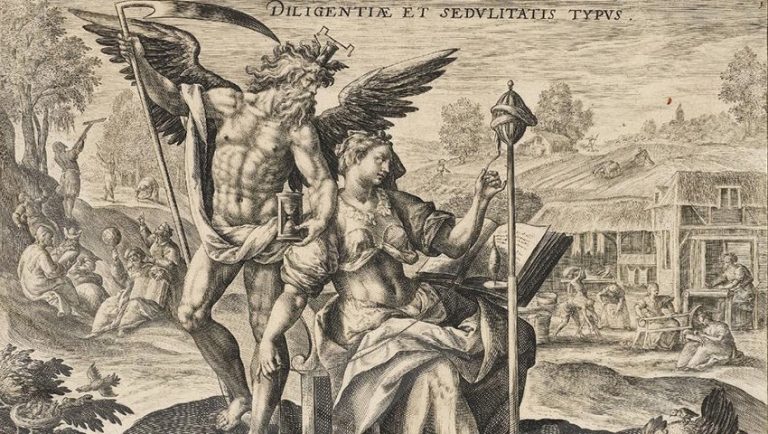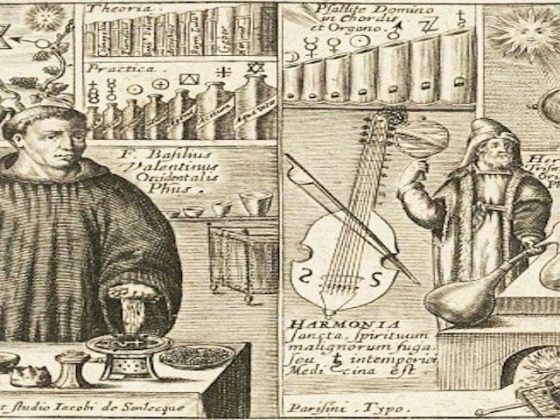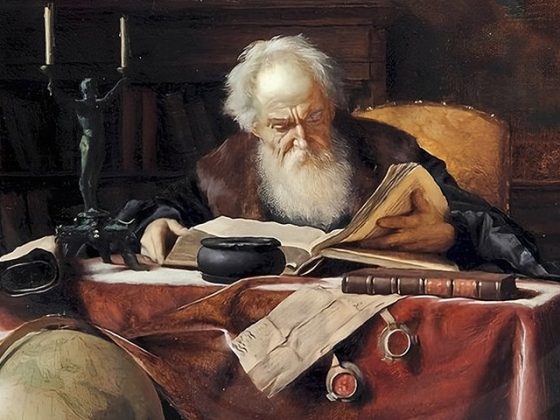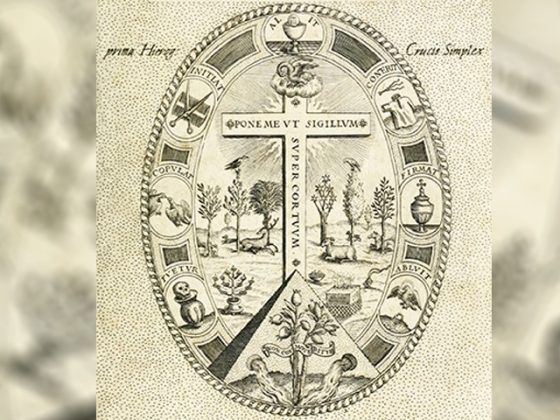Dearest reader friends:
I hasten to send you the present engraving entitled…
…DILIGENTIAE ET SEDVLITATIS TYPUS
─'The image of diligence and dedication'─
This artistic work was produced by Crispin de Pases the Elder, or Crispin van de Passe (1564-1637), a Flemish engraver, publisher and painter.
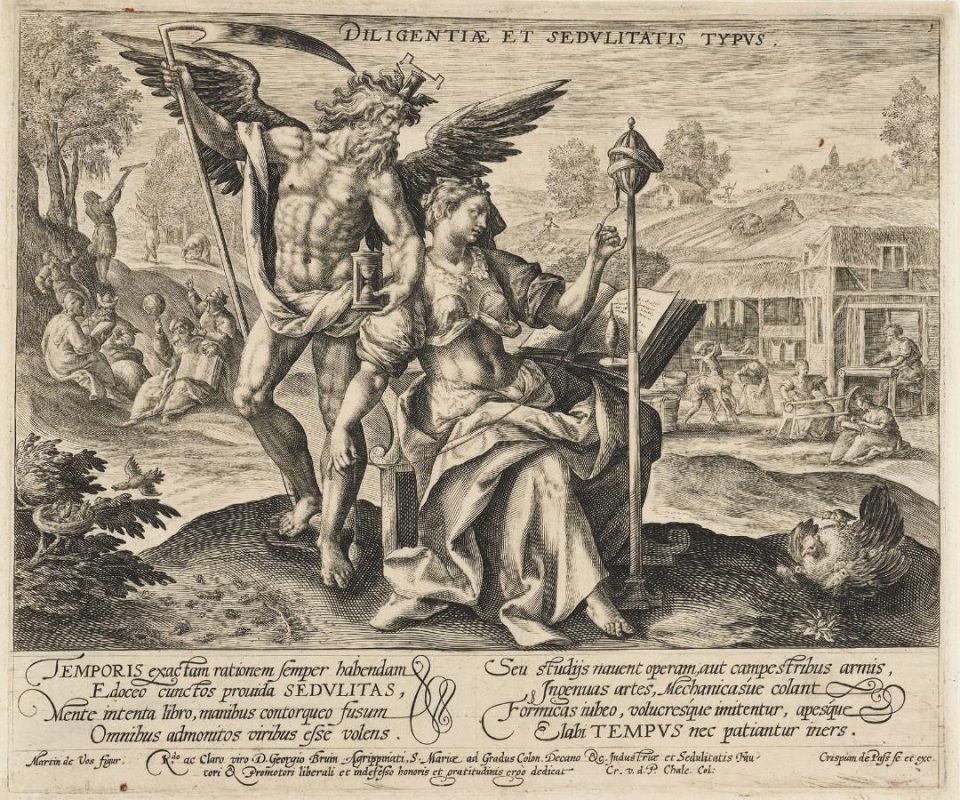
It depicts a winged character carrying a scythe in one of his hands and an hourglass in the other. Likewise, on his head he carries another hourglass. These attributes lead us to identify him with the wise Saturn, known by the Greeks as Cronus ─time─, a divinity that came to be recognized as Father Time, a cruel tyrant who devours everything, including his own children ─the human races─. Next to him we see a woman who represents the virtue of industriousness ─sedulitas─ in front of a loom or spinning wheel with which she is working.
Also, in the foreground we see a bird feeding its young, some ants always working and a hen taking care of her chicks…
Description:
Landscape with Father Time as a naked winged man with a scythe and an hourglass, and the female personification of diligence ─diligentia─ and industriousness ─sedulitas─, with a loom or spinning wheel. In the foreground a bird. On the left in the background we can also see a group of scholars whom some authors associate with the practice of the science of astronomy, and on the other hand on the right we can see the producers of wool. The lady of our topic has an open book on one of her legs and a lamp to point out the light that our work and our dedication to knowledge brings us. Such a book represents the laws of Nature. All this is based on commentaries in the Latin language. Latin text:
«TEMPORIS exactam rationem semper habendam
Edoceo cunctos prouida SEDVLITAS,
Mente intenta libro, manibus contorqueo fusum
Omnibus admonitos viribus esse volens
Seu studijs nauent operam, aut campestribus armis,
Ingenuas artes, Mechanicasue colant
Formicas iubeo, volucresque imitentur, apesque
Elabi TEMPVS nec patiantur iners».
Translation:
‘I, the cautious DEDICATION, explain to everyone that it is always necessary to have an exact calculation of TIME; with her mind occupied in a book, with her hands on the spindle. With all the strength wanting them to be cautioned.
Whether you carefully carry out a work or practice liberal or mechanical arts with rustic tools.
I proclaim: let the ants, the birds and the bees be imitated, which do not allow time to flow'.
Esteemed reader, this engraving is aimed at fighting against entropy in our horizontal life so as not to make us inert and irresponsible in our existence. That is why Saturn or Chronos is aware of the passage of time and if we do not take advantage of it, the moment will come when we will have to leave this world without having reached any goal. This gives rise to the Latin axiom that reads: Tempus irreparabile fugit ─ ‘time passes irremediably'─.
The scythe that Cronus or Saturn shows us that everything has a beginning and an end. Those who believe that our life is eternal or infinite are mistaken, because as long as we are entangled in the wheel of time we will be condemned to the pain of existing, having to kneel before the execrable grim reapers or angels of death in a given moment.
In another engraving that I will explain below, we will develop the theme of industriousness, but now regarding the matters pertinent to our experience of the vertical or metaphysical life. No one can venture to want to experience the kingdoms of the Spirit if he has not first made himself a responsible individual. It is what our Avatar explains to us when he tells us: “If we are not capable of being good householders, it is impossible to want to experience the Secret Path…”.
In the background of our illustration, there in the hills of the drawing, a peasant is working the field with the help of an old plough that is pulled by two bulls. Alchemically, ploughing the land means working on our philosophical earth, that is, our material body. On the other side, also on the hills, a man is bending down as if sowing something, perhaps seeds to make them grow. In any case, this is one of the many tasks to which we rational humanoids dedicate ourselves. We must understand very well that everything is born in its time, lives in its time, and dies in its time. Only the BEING is eternal and immutable, for this reason we say: HE IS HE………
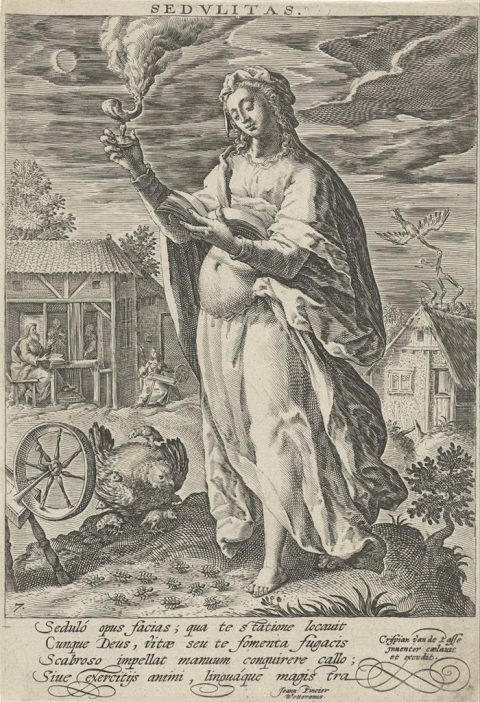
In this other engraving or illustration we now see the Divine Mother showing us her womb or cloister to make us understand that She is the one who gestates our spiritual life. That is why She bears the title of SEDULITAS ─'industriousness'─. In the image of our engraving we see Stella Maris carrying a lamp in Her right hand. Such a lamp points to the Light or infinite wisdom of God the Mother, and for this reason She also carries an open book in Her left hand. That is the open book that ISIS carries in Her lap in Arcanum 2 of the Tarot. She is the one who teaches us the Eternal Wisdom as we approach Her sanctuary.
Near the Divine Lady we see again a hen protecting her chicks. That is what Devi-Kundalini does with us, She is constantly watching over our spiritual well-being and She does it with a lot of permanent dedication.
In the background of this other engraving we see a small stable and on the outside of it we see an enlightened BEING who is leafing through the Holy Scriptures while two people look through some doors and observe the sage. This is to signal to us that we must imitate the prophets or enlightened ones and study the mysteries of life and death throughout our existence.
Both near the cabin that we see in the background and near the Divine Mother we see the image of a spinning wheel. The spinning wheel symbolizes the wheel of destiny itself, where the circumstances of our existence are woven or unwoven. Near the cabin a girl has a spinning wheel and near the sacred Ram-IO we observe the same instrument, for one is our material destiny and the other is the spiritual destiny that we deserve according to the actions of our life.
The womb of the Virgin is shown in this illustration to remind us that it is She who is gestating us as “Children of Light” or Adepts of the White Brotherhood. She has all the merit, we are only germs upon which She performs her work of gestation in order to turn us into a solar creation worthy of being taken into account by the eyes of the Eternal Father.
On the roof of a house near God-Mother we see a stork feeding her chicks, as if telling us that motherhood is an incessant work that She, the blessed Mother Nature, is always constantly doing, whether in her role as Mother Nature or as the Cosmic Mother or perhaps as our blessed Ram-IO.
At the foot of this second engraving we find again some Latin inscriptions, let us see them:
«Sedulo opus facias; qua te statione locauit cunque Deus, vitae seu te fomenta fugacis scabroso impellat manuum conquirere callo; siue exercitijs animi, linguaque magistra».
Translation: ‘May you laboriously accomplish the work in the position in which God has somehow placed you. May He push you to seek the sustenance of a fleeting life or on the rugged slope of manual work, or in the exercises of the mind, with eloquence as a teacher.'
The message that is transmitted to us in these lines is, precisely, an invitation to abandon idleness and to obey the will of the Father wherever we are or whatever profession we are engaged in. We are even told of working in a masterful way in spiritual offices for the satisfaction of our Real BEING. All these Latin phrases are addressed to our Consciousness so that we are more and more faithful to our teachings.
I share with you, in closing, a few sentences conducive to being reflected:
“Talent is like health, which when you enjoy it is when you least are aware of it.”
Helvetius
“Basic talent is one who guides others.”
Pascal
“Men are received according to the clothes they wear, but they are dismissed according to the talent they have shown.”
Saadi
“Talent is a gift that God gives us in secret and that we reveal without knowing it.”
Montesquieu
“Talent is formed in stillness, character in the torrent of the world.”
Goethe
JUS EST ARS BONI ET AEQUI.
─'The law is the art of goodness and equity'─.
KWEN KHAN KHU


